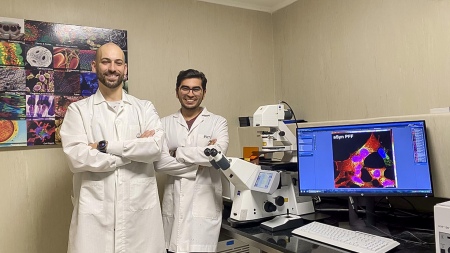A group of researchers from the Conicet de Tucumán demonstrated in in vitro studies that a derivative of a well-known antibiotic, tetracycline demeclocycline (DMC), has protective effects on neurons that are affected in Parkinson’s disease (PD), which lays the foundations to advance to preclinical studies to verify if it can prevent the death of these cells and, in this way, stop the progression of the pathology that affects 1% of the population over 65 years of age.
This is a molecule developed between the Institute for Research in Applied Molecular and Cellular Medicine (IMMCA, Conicet-UNT-Siprosa), based in Tucumán, and the Brain Institute in Paris (France), whose research was recently published in the prestigious Cells magazine.
“According to the scientific literature and the results of previous work that we carried out with the research group, we knew that there are some tetracyclines (antibiotics that are used for various diseases) that have neuroprotective capacities, which would be of potential use for both Parkinson’s and for Alzheimer’s, which are the two diseases we are investigating,” explained Rodrigo Tomas-Grau, co-author of the study and postdoctoral fellow from Conicet at IMMCA, to Télam.
“What we did together with the Brain Institute in Paris (France) was to synthesize a new molecule from demeclocycline that has no antibiotic capacity”Rodrigo Tomas-Grau, study co-author and postdoctoral fellow
“In this context, there was work with demeclocycline that showed that this molecule prevented the protein alpha-synuclein (aS) -present in brain cells called dopaminergic cells- from starting to aggregate in a toxic way, which is what can trigger Parkinson’s, or I was interfering in that process.”
Tomas-Grau explained that “the problem is that diseases such as Parkinson’s and Alzheimer’s are chronic and progressive diseases, so it is not possible to medicate with antibiotics for life, since it would lead to another problem, which would be resistance to these antibiotics.”
“What we did together with the Brain Institute in Paris (France) was to synthesize a new molecule from demeclocycline that does not have antibiotic capacity, that is, we modified a couple of things in its chemical structure to remove that capacity”described.
Once this new molecule was obtained, they carried out tests to see if it maintained its neuroprotective capacity and discovered that it not only continued this property, but that it was even better than the original demeclocycline with antibiotic capacity.

In addition to interfering with the toxic function of the alpha-synuclein (aS) protein, the researchers verified at the Parisian institute that the demeclocycline molecule they had created had anti-inflammatory effects on neurons that had been affected by the toxicity of the protein. .
Florencia González Lizárraga, an IMMCA postdoctoral fellow and the other co-author of this discovery, pointed out -for her part- that the new work is part of an “ambitious research project” financed by the National Agency for Scientific Promotion (ANPCyT), and that received a grant from the France Parkinson Association.
The researchers noted that the results suggest that this molecule may be a promising candidate as a drug for the development of preclinical studies of the disease Parkinson’s in animal models.
Asked about the next steps, Tomas-Grau pointed out that “this is the first phase, which is the development of the molecule and its testing in test tubes and with cells; with this evidence, the next step would be to start testing it in animal models. , these are transgenic mice that have characteristics of the disease, which are called pre-clinical studies, to verify efficacy and safety.”
The results suggest that this molecule may be a promising candidate as a drug for the development of preclinical studies of Parkinson’s disease in animal models.
“Only after having successfully navigated many of these trials in model organisms of the disease, could it be a candidate for human trials. The road is long, but given the abundant evidence of the neuroprotective effect of tetracyclines, we believe that it justifies further work in this direction. “, indicated Tomas-Grau, who also indicated that “beyond this development we continue in the search for new molecules; we are following the same path with three others and we are very advanced. This is a round of synthesis of new molecules that are going presenting to the world to develop specific studies and come up with new drugs”.
The study was led by Rosana Chehín, PhD in Biochemistry and Conicet researcher at IMMCA, and Bruno Figadère, from the University of Paris-Sud Saclay, in France; Dr. Raisman Vozari and Michael Patrick, who were key in the articulation with France, also make up the group.

What is Parkinson’s disease
Parkinson’s disease was described and characterized more than 200 years ago; nevertheless, To date, there is no drug capable of stopping or even slowing down the process of neuronal death.only those of a palliative nature that act by relieving the symptoms of the disease are available.
It is a degenerative brain condition associated with motor symptoms (slowness of movement, tremors, stiffness and imbalance) and other complications such as cognitive impairment, mental disorders, sleep disorders, pain and sensory disturbances.
Worldwide, disability and deaths due to Parkinson’s disease are increasing faster than those of any other neurological disorder.
As reported by the World Health Organization, the prevalence of Parkinson’s disease has doubled in the last 25 years and it is estimated that by 2030 it could double again.
















